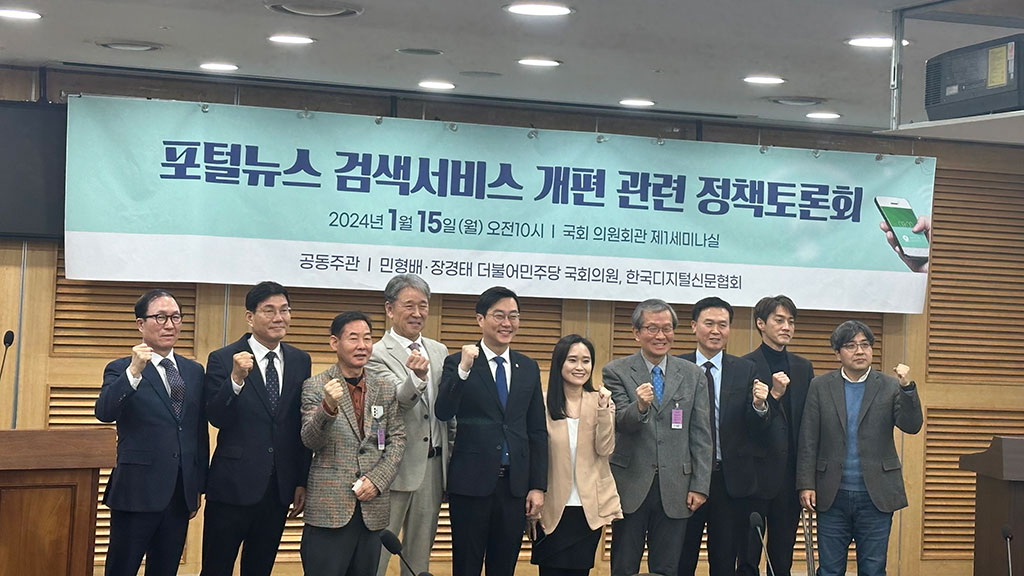최근 카카오는 다음 뉴스 검색 기본값을 언론사 전체 1176개에서 콘텐츠 제휴사(CP) 146개로 대폭 줄였다. 생성 AI의 도입은 기존 검색 제휴 언론사뿐만 아니라 네이버, 카카오 등과 제휴하지 않았던 다양한 매체에게 기회를 제공할 것으로 기대된다.
포털사, 뉴스검색 시스템 일방적 개편 강행
언론사, 생성 AI로 변화하는 패러다임 대응
생성 AI의 도입은 다양한 사회적 변화를 초래하고 있다. 플랫폼 사업자들이 생성 AI를 자사의 서비스에 적용하는 것이 보편화 됨에 따라 플랫폼에 의존했던 기존 언론사의 비즈니스 형태도 새로운 국면을 맞고 있다.
더불어민주당 민형배 의원, 장경태 의원과 한국디지털신문협회가 공동 주관한 ‘포털뉴스 검색서비스 개편 관련 정책토론회’가 국회 의원회관 제1세미나실에서 15일 열렸다.
■ 카카오, 포털 뉴스검색 서비스 개편
지난해 8월 네이버는 콘텐츠 제휴사(CP) 우대 검색옵션 기능을 추가하고, 11월 카카오는 다음 뉴스 검색 기본값을 언론사 전체 1176개에서 CP사 146개로 대폭 줄였다.
자율규제 기구였던 뉴스제휴평가위(이하 뉴스제평위)도 미디어 환경에 적합한 제휴 모델을 만들기 위해 검토한다는 명목으로 지난해 5월 잠정 중단됐지만 이후 구체적 방안은 마련되지 않았다. 당시 양대 포털에 대해 다수 언론사들은 10%의 언론사를 위해 90%를 몰아내고 있는 상황을 이해할 길이 없다는 행보라고 말했다.
플랫폼사의 일방적 서비스 변경은 △이용자의 알 권리 제한 △표현의 자유 침해 △뉴스 공론장 왜곡 △언론사 차별 등 불공정 행위로 지적될 수 있다. 플랫폼 기업들의 시스템은 그들의 시장 지배력을 강화하고 있다. 불투명한 알고리즘, 포털 인링크 방식 등은 언론사 이용률을 저하하고, 양자 간 협상력 격차를 유발해 언론사들의 포털 의존 및 종속을 심화한다. 현재 포털 뉴스 생태계는 제도적 차원의 문제점을 안고 있다.
특히 플랫폼사와 언론사의 갈등은 포털 뉴스 관련 규제에 한계가 존재함으로써 깊어지고 있다. 포털 사이트는 민간 기업이기 때문에 표현의 자유, 과잉 규제, 형평성, 실효성 등에서 규제 자체가 어렵다는 문제에서 비롯된다.
이날 토론회를 개최한 더민주 민형배 의원은 “중소, 지역, 인터넷 언론은 주요 뉴스 공급사를 잃어 위기를 맞이했고 이용자들의 자유로운 선택권도 제한됐다”며, “다양한 뉴스가 공존하는 포털 생태계 복원 방안을 모색해야 한다”고 말했다.
발제자 한양대 유승현 언론정보대학원 교수는 이를 극복하기 위해 현재 생태계를 개선하기 위한 각 주체들의 균형과 조화를 이루기 위한 거버넌스를 구축해야 하는 방안을 제시했다. 상호협력적 상생 모델을 고려해 정부는 통합적으로 생태계를 감시 및 지원하며, 언론사, 방송사, 포털이 동등한 위치에서 정책을 논의해야 한다는 설명이다. 유 교수는 뉴스제평위에 대해 평가하고, 현행 포털 뉴스 서비스를 대안할 ‘언론사 공동 뉴스 포털’의 도입도 고려해야 한다고 덧붙였다.
■ 생성 AI, 언론사의 틀 바꾼다
언론사와 포털의 관계 재정립도 필요하다. 유 교수는 “언론사와 포털 간 제휴 방식 및 공정성 기준 확립, 뉴스 콘텐츠 대가 산정 방식 등의 재논의가 필요하다”고 말했다.
최근 해외에서는 이같은 흐름이 발생하고 있다. 구글은 뉴욕타임스에 콘텐츠 사용 대가 3년 1억불을 지불하기로 했으며, 유럽연합(EU)도 플랫폼 사업자와 뉴스 콘텐츠 협상을 진행하는 등 글로벌 언론사와 플랫폼사의 관계가 변하고 있다.
생성 AI는 여기에 한 몫을 하고 있다. 생성 AI의 도입은 기존 검색 제휴 언론사뿐만 아니라 네이버, 카카오 등과 제휴하지 않았던 다양한 매체에게 기회를 제공할 것으로 기대된다. 생성 AI는 학습을 위해 수많은 데이터를 필요로 하는데, 이 경우 뉴스 기사와 출판물에서 추출된 텍스트가 언어 데이터를 제공할 수 있다.
특히 단순 붙여넣기, 퍼나르기 식이 아닌 양질의 뉴스 콘텐츠는 생성 AI로 만들어진 사회적 콘텐츠, 창조물에 대한 실시간 팩트 체크를 효율적으로 수행할 수 있다. 퍼블리시 김위근 최고연구책임자는 “언론사는 생성 AI가 만들어낸 사회적 콘텐츠의 검증 기관으로서 역할이 강조될 것”이라고 주장했다.
예컨대 챗GPT 오픈 AI는 미국 언론사들과 저작권 협상을 진행하고 있다. 지난주 ‘GPT 스토어’를 내놓은 후, GPT의 정확성을 높일 수 있도록 뉴스 콘텐츠를 사용할 계획을 세우고 있다. 이에 앞서 최근 애플도 챗GPT의 대항마 생성 AI 모델 개발을 위해 언론사, 출판사와 접촉하고 있다는 외신이 보도된 바 있다. 애플이 보그(Vogue), 더 뉴요커(The New Yorker)의 콘데 나스트 미디어 그룹과, NBC 뉴스, 피플지, 더데일리비스트의 IAC 그룹 등과 라이센스 계약을 추진하며 약 650억원을 제안했다는 설명이다.
이에 따라 언론의 신뢰성은 더욱 주목받을 것으로 기대된다. 매체는 생성 AI를 사용해 허위 뉴스, 가짜 정보를 작성하지 않도록 저작권 침해에 대해 숙지하며 팩트 체크에 집중해야 한다는 의견이다. 지금까지 뉴스 섹션이 이용자의 주목도를 끌기 위해 콘텐츠 게시 순서, 자극적인 제목 등으로 트래픽을 발생시켰다면, 플랫폼에 의존했던 언론사의 비즈니스 모델은 점차 사라짐과 함께 검증이 가능한 양질의 콘텐츠를 제공하는 언론사의 역량이 더 주목받을 것으로 기대된다.
생성 AI가 다양한 비즈니스의 패러다임을 변화시키고 있는 가운데, 언론사는 불공정한 부분에는 함께 대응하는 한편 언론사가 국가, 지역, 시민에게 제공할 수 있는 새로운 역할을 수행함에 있어 게을리해서는 안 된다고 전문가들은 입을 모으고 있다.
